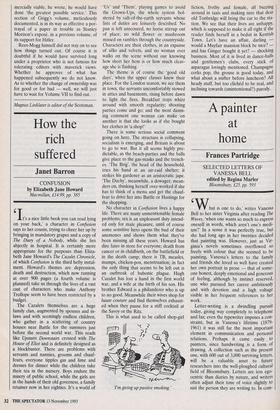How the rich suffered
Janet Barron
CONFUSION by Elizabeth Jane Howard Macmillan, £14.99, pp. 385 It's a nice little book you can read lying on your back,' a character in Confusion says to her cousin, trying to cheer her up by bringing in mandatory grapes and a copy of The Dial), of a Nobody, while she lies abjectly in hospital. It is certainly more appropriate for the purposes than Eliza- beth Jane Howard's The Cazalet Chronicle, of which Confusion is the third hefty instal- ment. Howard's themes are depression, death and destruction, which now running at over 900 pages (a fourth volume is planned) take us through the lives of a vast cast of characters who make Anthony Trollope seem to have been restricted by a budget.
The Cazalets themselves are a huge family clan, augmented by spouses and in- laws and with seemingly endless children, who gather in a scattering of country houses near Battle for the summers just before the second world war. This reads like Upstairs Downstairs crossed with The House of Eliot and is definitely designed as a blockbuster. There are problems with servants and nannies, grooms and chauf- feurs, everyone tipples gin and lime and dresses for dinner while the children take their tea in the nursery. Boys endure the misery of public school, while the girls are in the hands of their old governess, a family retainer now in her eighties. It's a world of
'Us' and 'Them', playing games to avoid the Grown-Ups, the whole system bol- stered by salt-of-the-earth servants whose lists of duties are leisurely described. No pan is left unscoured, no horse stirrup out of place; no wild flower or mushroom missed on rambles through the countryside. Characters are their clothes, in an expanse of silks and velvets, and no woman ever walks on the scene without our knowing how short her hem is or how much cleav- age she is flashing.
The theme is of course the 'good old days', when the upper classes knew their place. For the London season, we see them in town, the servants uncomfortably stowed in attics and basements, rising before dawn to light the fires. Breakfast trays whizz around with smooth regularity; shooting parties come and go; and the most damn- ing comment one woman can make on another is that she looks as if she bought her clothes in 'a shop!'
There is some serious social comment going on here. The structure is collapsing, socialism is emerging, and Britain is about to go to war. But it all seems highly pre- dictable, as the beach-parties and the balls give place to the gas-masks and the trench- es. 'The Brig', the head of the household, tries his hand at an air-raid shelter; it strikes his gardener as an aristocratic jape. 'The Duchy', meanwhile, a dowager, mean- ders on, thinking herself over-worked if she has to think of a menu and get the chauf- feur to drive her into Battle or Hastings for the shopping.
No character in Confusion lives a happy life. There are many unmentionable female problems; sex is an unpleasant duty intend- ed only for male pleasure, until of course some sensitive hero opens the bud of their anemones and shows them what they've been missing all these years. Howard has dire fates in store for everyone; death from cancer or in childbirth, on the battlefield or in the death camp; there is TB, measles, mumps, chicken-pox, menstruation; in fact the only thing that seems to be left out is an outbreak of bubonic plague. Hugh Cazalet has lost a hand in the first world war, and a wife at the birth of his son. His brother Edward is a philanderer who is up to no good. Meanwhile their wives shop for haute couture and find themselves exhaust- ed when they pause for a stiff cocktail at the Savoy or the Ritz.
This is what used to be called shop-girl 'I'm giving up passive smoking.' fiction, frothy and female, all buzzing around in taxis and making sure that dear old Tonbridge will bring the car to the sta- tion. We see that their lives are unhappy, which is supposed to make it all right if the reader finds herself in a bedsit in Kentish Town. Let's have an affair, darling — would a Mayfair mansion block be nice? — and has Ginger bought it yet? — shocking business. Most of it is lived in dance-halls and gentlemen's clubs, every stick of asparagus lovingly mentioned. Champagne corks pop, the grouse is good today, and what about a snifter before luncheon? All heady stuff, but too cliched to be real, and inclining towards (unintentional?) parody.


























































 Previous page
Previous page